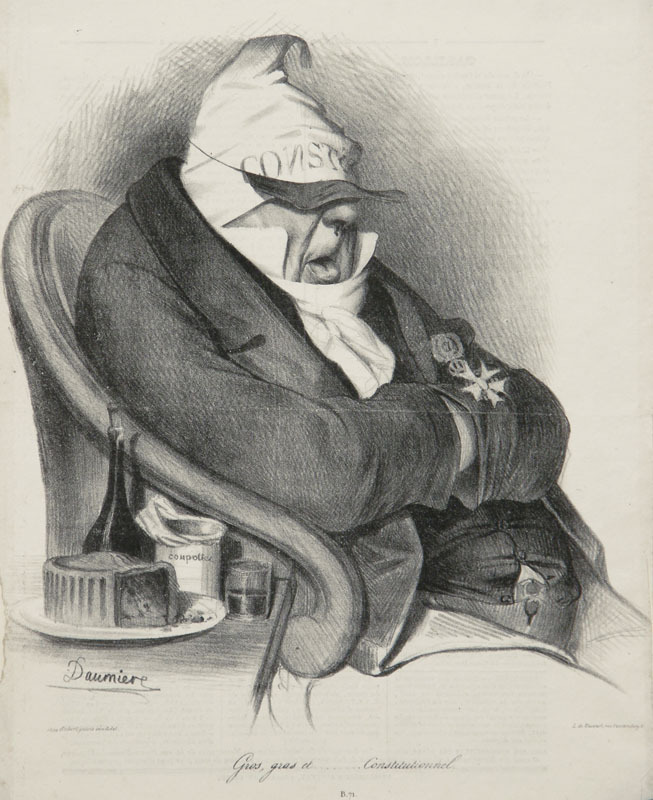
19th, 20th & 21st Century Fine Prints
707-546-7352 · fax 707-546-7924 · web: www.annexgalleries.com · email: artannex@aol.com
Gros, gras et........Constitutionnel by Honore Daumier

Gros, gras et........Constitutionnel
Honore Daumier
Title
Gros, gras et........Constitutionnel
Artist
Honore Daumier
1808 - 1897 (biography)Year
1833
Technique
lithograph
Image Size
10 7/16 x 9 3/8" image, without text
Signature
signed "Daumier" in the stone, lower left
Edition Size
not limited
Annotations
Lower left: "Chez Aubert, galerie vero dodat", center: "B.71"; lower right: "L. deBecquet, rue Fursenberg 6"
Reference
Delteil 176 ; HD 441; DR 176
Paper
antique-white wove
State
ii/ii
Publisher
Philipon for Charivari, November 19, 1833
Inventory ID
17503
Price
SOLD
Description
This print shows that the King and the conservative newspaper "Le Constitutionnel" are the same. The bourgeoisie is a sleepy overweight man; his cap is covering his eyes, showing that this paper has no outlook into the future. A bottle of wine and a glass on the table, but most importantly, the cross of the Legion of Honor, the dream of every bourgeois of the period. The subject, Charles Guillaume Etienne (1777 - 1845) was an important journalist and author. He wrote the libretto for the opera “La Joconde” (music by Nicolo, 1814) and in 1811 became member of the Académie Française, an honour which was revoked in 1815. He served as a Deputy for his district Meuse from 1820 -1824 and again from 1827-1839. He was directing the paper “Le Constitutionnel”, preceding Véron, and was politically linked to Guizot. He was a well known journalist and founder of the newspaper “L'Indépendent”, which later changed its name to “Le Constitutionnel”. He was a favourite target for the caricaturists of the Charivari, who described him as being “ fat, big…. and constitutional”. Daumier depicted him in his busts as well as in his lithographs with chubby cheeks, puffy eyes and thriving in self-satisfaction. Etienne can be considered a converted Bonapartist, a benefactor of Thiers. Under his management, the Constitutionnel became the government organ. His influence was remarkable, since newspaper reading at that time was an institution, not an amusement. Taken from “The Daumier Register”, Dieter and Lilian Noack.
